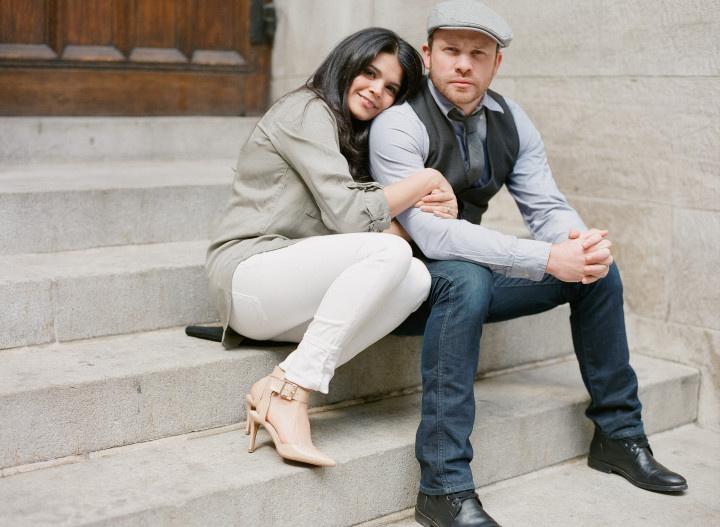Living Together Before Marriage: Expectations vs. Reality
Here, relationship experts give those “living together before marriage” expectations a healthy dose of reality.


Photo: Rivkah | Fine Art Photography
Living together before marriage — or even prior to getting engaged — can be a good indicator of what married life is actually like. In fact, 67 percent of couples do live together before their engagement. Others, though, are a bit warier of taking this step pre-engagement or before marriage, whether it’s for tradition’s sake or concern about losing independence before it’s absolutely necessary. And while there's nothing like waking up every morning to the person you love (who is also willing to spoon and snuggle you), there will be a few surprises along your road to roommate bliss.
Are you planning on living together before marriage? Give these expectations a healthy dose of reality.
Expectation: You’ll spend so much more time together.
Reality: While this isn’t entirely untrue—after all, clocking a solid eight hours lying next to each other in bed each night counts for something!—you might envision a whole lot more date nights in your horizon. But Claudia Six, clinical sexologist, relationship coach and author, points out that this likely won’t be the case. “It’s when you live together that you might actually most need ‘me’ time, time without your beloved,” she explains. “It’s important to have things that you do for you: your own friends, your own hobbies, your own exercise routine. Otherwise you lose your sense of who you.” Remember, a good balance of work, friends, family and, of course, intimate nights that are about just the two of you, is key to a happy relationship. And, as Dr. Six notes, absence makes the heart grow fonder…
Expectation: You’ll have sex as often and as passionate as before you lived together.
Reality: This is especially true when couples haven’t lived together (with a romantic partner) before, notes April Masini, New York-based relationship and etiquette expert and author. “They expect that what they know to be true in the relationship, will continue.” But the reality is that living together can throw a wrench in the middle of what used to get each of you revved up.“ Seeing a partner naked all the time, using the bathroom and losing the sense of urgency that dating can foster with sex, can dampen your sex life and dash your expectations,” Masini explains. “When couples have a more seasoned view of sex over the long term, they’re less disappointed when their sex lives ebb and flow when they live together.”

Photo: Chelsea Brown Photography
Expectation: It’ll be so much easier to manage money under one roof.
Reality: “When couples date, money is often an afterthought, and the romance, sex and excitement of having found someone can cause couples not to think about the reality of money,” explains Masini. “Living together yanks the covers off the eyes of couples trying to avert their gaze from discrepancies in money styles.” While dating puts the emphasis on romance and sex, she notes that living together before marriage makes money a harsh reality. In other words, who pays for what is likely to become more of an issue than it was before, since you’ll be splitting for more than just your dinner out. Masini recommends talking it through ahead of time, during the time you’re living together and schedule future money talks on a regular basis.
Expectation: You’ll lose your independence and freedom.
Reality: Dr. Six notes that it’s more common for men to have this fear than women, but both genders can experience a fear of losing their individuality and free time. “Freedom represents different things to different people,” she says. “It might be the option of playing pool and having a couple of beers with friends, on short notice, playing guitar in the basement until late at night, or sitting in their underwear watching TV and eating tortilla chips.” For others, it might mean reading a favorite book at night in silence, without the sound of guitar blasting friends yelling. To to find a happy medium, it’s important to continue doing the things that make you individually happy. “This way you bring your happy self home to your significant other, who hopefully is bringing their happy self home too,” says Dr. Six. “Then you can talk about your day and the things you’ve done while you were apart.”

Photo: Cara Leonard Photography
Expectation: Your tastes in style and decor will fuse together effortlessly.
Reality: Chances are, this won’t be the case. Maybe you’ve envisioned a coral-toned, aquarium-inspired bathroom decor and he’s dead set on keeping his red shaggy bath rug and Giants logo-clad shower curtain. “What we often see happen is that she takes over because she has ‘better taste’ and ‘a woman’s touch,’ leaving him feeling disregarded and unseen, a stranger in his own home,” says Dr. Six. “It might sound sexist, but in my 25 years of couples counseling this is what I hear.” Her solution? Discuss decor ahead of time and come to an agreement about who will decorate each area of your shared home. “If he is attached to his barcalounger, you need to make room for it. And if she has a favorite dresser from her grandmother, that doesn’t match anything, you need to find a special place for it,” she explains. “In order to set yourself up for success, you need to agree on how the physical space is used and adorned.” You can also set up your wedding registry to decorate your home together—and get rid of old stuff in favor of the new.
Expectation: You’ll cook romantic dinners and enjoy cozy snacks on the terrace or front yard.
Reality: While this sounds nice and may be attainable once in awhile, Masini notes that the reality may be less appetizing. “If your idea of dining is healthy, home cooked meals on tablecloths, with place settings and candlelight, while your partner finds eating over the sink, with utensils being a neat idea, but not a necessity, you might run into some arguments,” she says. Address this problem head on to avoid smoldering resentment. “If one of you is on a low - or no-carb diet and the other buys croissants in bulk, ask for a favor in terms of no bread, or just on the weekends, in the house,” she suggests. “In exchange, give in on something he or she would want that you’ve been holding out on—in any arena of your relationship.” For instance, dinners are at the table, and all other meals are a free for for all. Whatever you decide is fine, if it works for the two of you, she says. “Just understand that this is a process and the first solution you try may not be your last.”





